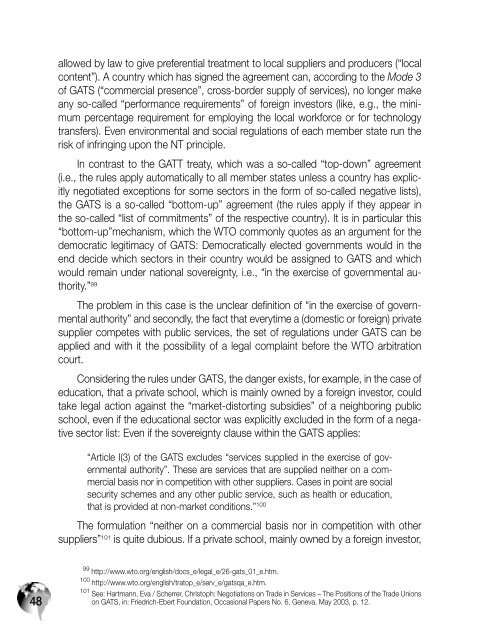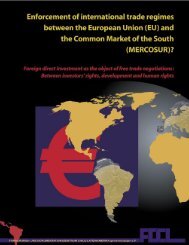Download - FDCL
Download - FDCL
Download - FDCL
You also want an ePaper? Increase the reach of your titles
YUMPU automatically turns print PDFs into web optimized ePapers that Google loves.
48<br />
allowed by law to give preferential treatment to local suppliers and producers (“local<br />
content”). A country which has signed the agreement can, according to the Mode 3<br />
of GATS (“commercial presence”, cross-border supply of services), no longer make<br />
any so-called “performance requirements” of foreign investors (like, e.g., the minimum<br />
percentage requirement for employing the local workforce or for technology<br />
transfers). Even environmental and social regulations of each member state run the<br />
risk of infringing upon the NT principle.<br />
In contrast to the GATT treaty, which was a so-called “top-down” agreement<br />
(i.e., the rules apply automatically to all member states unless a country has explicitly<br />
negotiated exceptions for some sectors in the form of so-called negative lists),<br />
the GATS is a so-called “bottom-up” agreement (the rules apply if they appear in<br />
the so-called “list of commitments” of the respective country). It is in particular this<br />
“bottom-up”mechanism, which the WTO commonly quotes as an argument for the<br />
democratic legitimacy of GATS: Democratically elected governments would in the<br />
end decide which sectors in their country would be assigned to GATS and which<br />
would remain under national sovereignty, i.e., “in the exercise of governmental authority.”<br />
99<br />
The problem in this case is the unclear definition of “in the exercise of governmental<br />
authority” and secondly, the fact that everytime a (domestic or foreign) private<br />
supplier competes with public services, the set of regulations under GATS can be<br />
applied and with it the possibility of a legal complaint before the WTO arbitration<br />
court.<br />
Considering the rules under GATS, the danger exists, for example, in the case of<br />
education, that a private school, which is mainly owned by a foreign investor, could<br />
take legal action against the “market-distorting subsidies” of a neighboring public<br />
school, even if the educational sector was explicitly excluded in the form of a negative<br />
sector list: Even if the sovereignty clause within the GATS applies:<br />
“Article I(3) of the GATS excludes “services supplied in the exercise of governmental<br />
authority”. These are services that are supplied neither on a commercial<br />
basis nor in competition with other suppliers. Cases in point are social<br />
security schemes and any other public service, such as health or education,<br />
that is provided at non-market conditions.” 100<br />
The formulation “neither on a commercial basis nor in competition with other<br />
suppliers” 101 is quite dubious. If a private school, mainly owned by a foreign investor,<br />
99<br />
http://www.wto.org/english/docs_e/legal_e/26-gats_01_e.htm.<br />
100<br />
http://www.wto.org/english/tratop_e/serv_e/gatsqa_e.htm.<br />
101<br />
See: Hartmann, Eva / Scherrer, Christoph: Negotiations on Trade in Services – The Positions of the Trade Unions<br />
on GATS, in: Friedrich-Ebert Foundation, Occasional Papers No. 6, Geneva, May 2003, p. 12.









